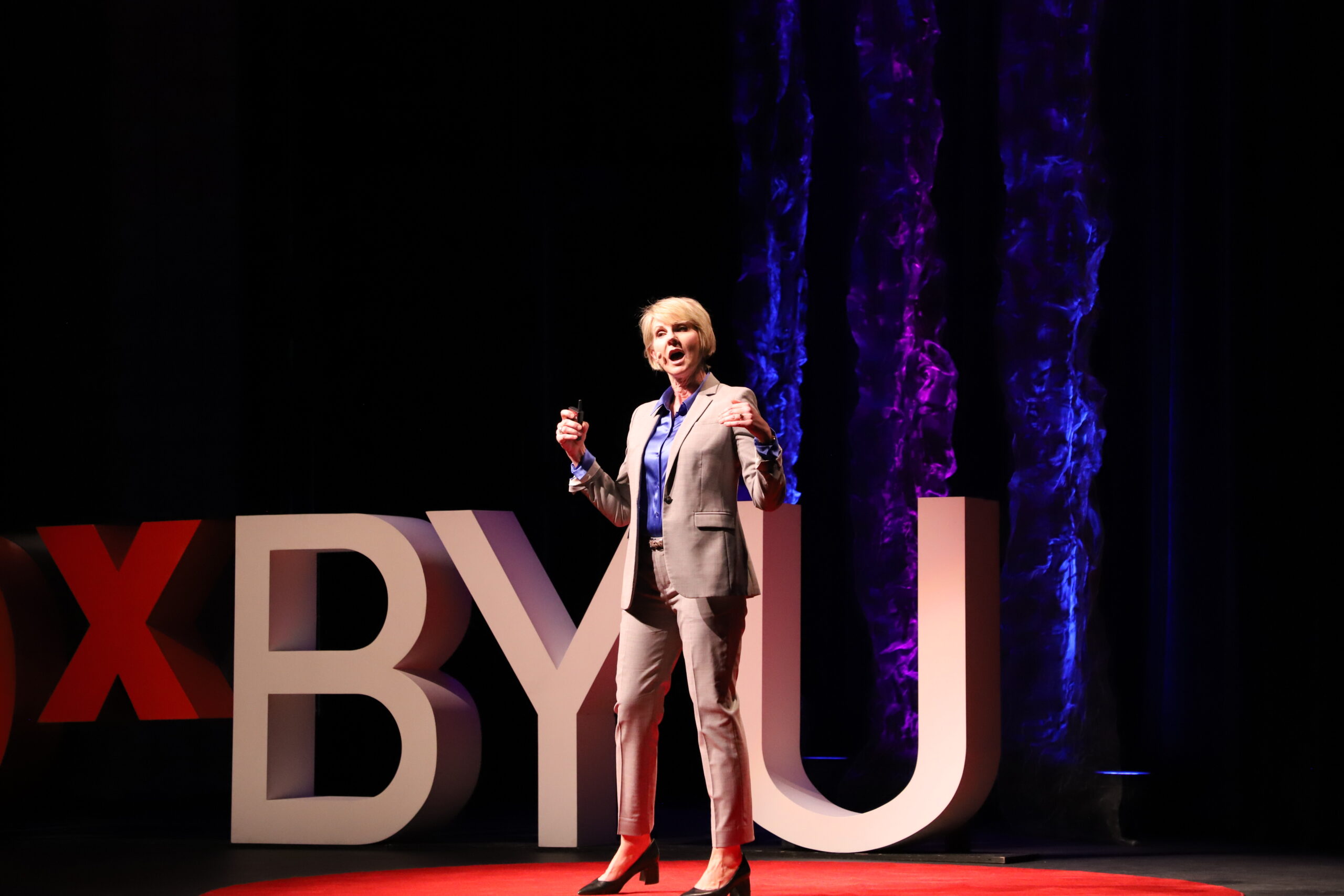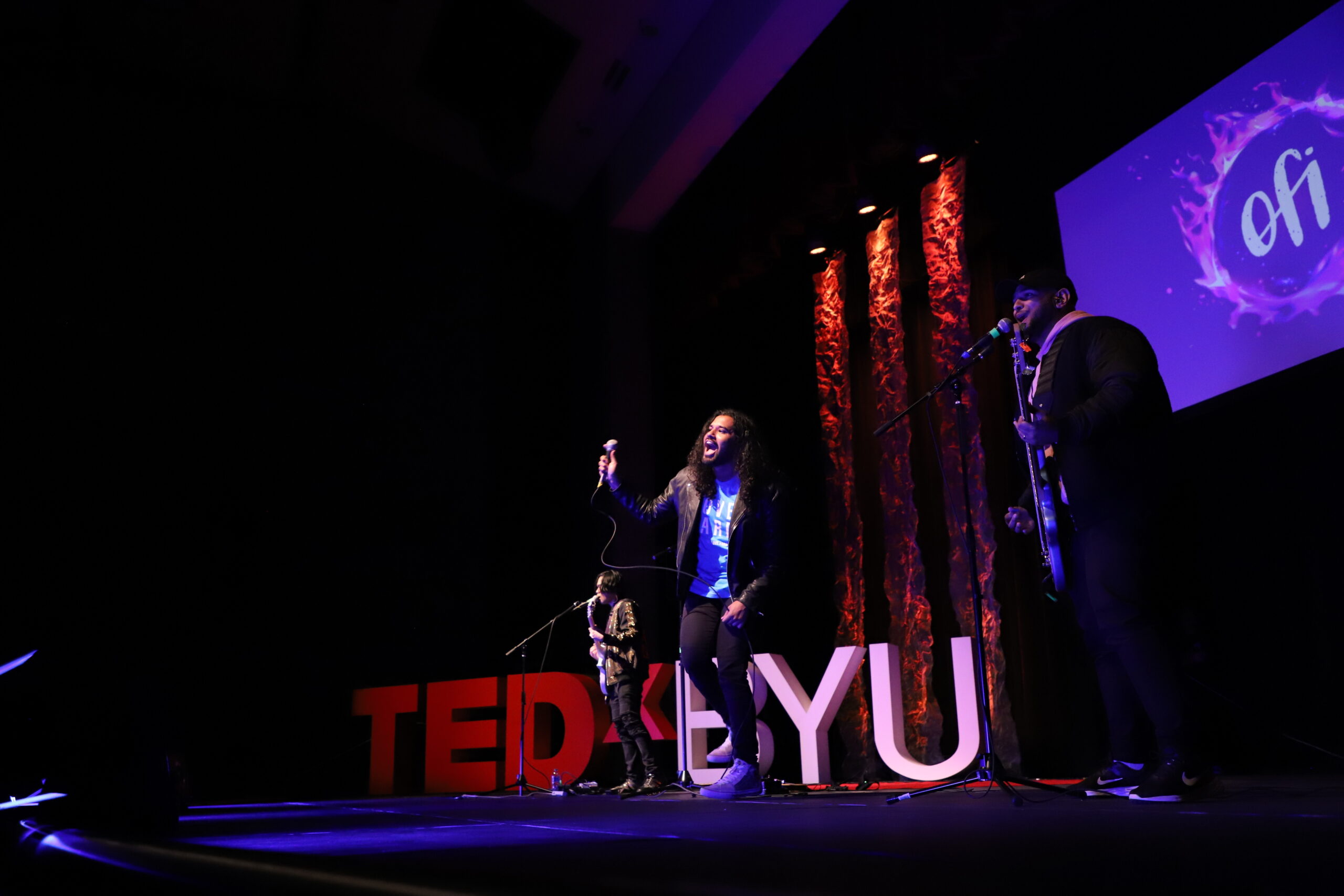
TEDxBYU returned to the Covey Center for the Arts as an in-person event on March 17 after being cancelled in 2020 and taking place remotely in 2021 because of the COVID-19 pandemic.
TEDxBYU is a local and independently organized TED event that brings people together to share “ideas worth spreading.”
This year the BYU Ballard Center, host of TEDxBYU, chose the speakers according to the issues and topics they considered necessary to address.
“The way that we do it is that we think about what issues we want addressed and then we figure out who is in that space that could speak about it,” Ballard Center student employee Hannah Koford said. “Even though TEDxBYU is about people, it is more about the experiences they had and the way they address them.”
As a result, the presentations discussed different topics such as the link between dating apps and sexual violence, climate change in the Antarctic, rooting out implicit biases and using blockchain as a means of ending poverty.
Although the audience was formed by people from all age groups, there was a great number of BYU students who attended the event.
“I feel like TEDxBYU is a great way to broaden your horizons in just one night, which is kind of unheard of, because it usually takes a study abroad to get the many different perspectives that we’re getting here tonight,” said Daniel Andersen, a BYU journalism student who was one of the volunteers at the event.
BYU faculty and staff members also attended TEDxBYU to support fellow professors who were giving presentations and to learn from their life experiences and diverse backgrounds.
“I talked to the Ballard Center about TedXBYU last fall and they told me they were going to do a focus on belonging, so I came here to see if I can gain anything from the speakers, as my job is linked to inclusion,” said Staci Carroll, the manager of diversity and inclusion in the Marriott School of Business.
In addition to the speakers, TEDxBYU also included a musical performance by the singer-songwriter and teen mental health advocate Ofi.





Dating apps and sexual violence
BYU forensic nursing professor and certified sexual assault examiner Julie Valentine presented part of her research on dating app-facilitated sexual assault.
“Researchers have found some gender differences regarding motivation to using dating apps with women more likely to use them for friendship and validation and men more likely to use them for excitement and casual sex,” Valentine said.
She said out of the 1,968 sexual assault reports in Utah made from 2017–2020, 274 met the criteria of meeting on a dating app and being raped in the first in-person meeting.
Additionally, half of the dating app-facilitated sexual assault victims were college students and 60% reported having a mental illness, Valentine said. She said these discoveries show that violent sexual predators use dating apps to reach vulnerable victims.
“In order to solve this problem, the current approach of telling dating app users to be careful is failing because it places the burden of preventing sexual assault on the victim,” Valentine said. “So if the victim doesn’t follow safety guidelines, they might feel like they are to blame for the rape and will not report, and if the victim fails to report, predators keep attacking.”
Valentine said there are many possible solutions dating apps could implement such as conducting criminal background checks at no additional cost, using artificial intelligence to pick up on threats or unwanted messages or providing clear channels for the victims to report assault.
She also reminded the audience the first step to end sexual violence as a society is to believe victims.
“The major myth out there is that there is a lot of false reporting in rape, but this is simply not true,” Valentine said. “Multiple research studies have found that false reporting in rape is low, between 2–8%, which is the same as other crimes. We must believe victims.”
Blockchain can end poverty
Ashish Gadnis is the CEO of BanQu, a company that looks to help people get out of poverty through its supply chain sustainability. In his TEDxBYU talk, Gadnis raised awareness about the lack of support farmers and supply chain workers have, especially women.
Gadnis said supply chains fail to recognize the work of their employees and therefore jeopardize their possibilities of getting out of poverty. His solution to this problem is making sure that if two parties participate in a “blockchain transaction” that both parties get a copy of it.
“This is important because as we look at intersectional extreme poverty, gender inequality and climate change, all of it lands at the start of a supply chain,” Gadnis said. “By giving the workers a copy of the transaction they are a part of we are legitimizing the existence of people who work in supply chains every day.”
Unearthing implicit bias
Kelly Terbasket is the co-founder of IndigenEYEZ, a platform to support and empower Indigenous people. She shared her experience with her own implicit bias toward the group and suggested learning about their history could help eradicate these biases.
“Indigenous people have so much to offer, but our implicit biases get in the way of seeing that,” Terbasket said.
Terbasket is of Syilx, German and English heritage. She said at a young age she had already internalized the dominant narrative that to be Indigenous was to be inferior and she felt embarrassed of her roots. However, she decided to learn about the teachings and misconceptions of her culture as well as the history of colonialism and the genocide of her ancestors.
“Learning about all the injustices that have happened to Indigenous people has helped to transform my internalized biases,” Terbasket said.
She ended her presentation by encouraging others to listen, notice and learn about Indigenous peoples’ history to eradicate implicit biases.
Climate changes in the Antarctic
BYU biology professor Byron Adams has spent the past 20 years studying the terrestrial ecosystems of Antarctica. He talked about how curiosity-driven research can help people understand and solve problems like climate change.
Adams told the audience about his journey going through the transantarctic mountains and studying the animals that have acclimated to the cold conditions of the continent.
“The animals I have been studying in Antarctica can tell us something about how terrestrial ecosystems are responding to climate change,” Adams said. “Their living conditions are getting harsher and species are gong extinct.”
Adams said the species and soil of Antarctica are going through climate changes. Some parts of the continent that used to be terrestrial are now covered by water, which decreases the likelihood of life finding a way to continue existing, he said.
By the end of his presentation, Adams emphasized the need to support curiosity-driven questions as well as “empowering and supporting teachers to provide kids with what they need to answer the questions their curiosity raises.”
Combating internet trolling
BYU public relations associate professor Pamela Brubaker talked about understanding internet trolls and deciding not to be one. Brubaker said trolls are individuals whose main intentions are making people uncomfortable through online comments and interactions.
She talked about how trolls’ motives are never altruistic and because they need to feed their ego and self-esteem, they seek provoking others just to get a response and to see them suffer.
“We all have a tendency to act like trolls,” Brubaker said. “When you don’t have to be face-to-face with a person it’s easy to be cruel.”
As a remedy to combatting the trolls, she suggested not to feed them with other comments or angry responses and she asked the audience members to remember that “We can have the courage to be compassionate, even in an online environment where it may seem like everything goes.”




